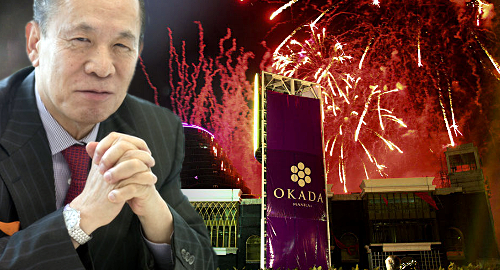 Japanese billionaire Kazuo Okada celebrated the ‘public preview’ of his new Okada Manila resort by predicting the Philippines’ casino revenue would one day overtake Singapore.
Japanese billionaire Kazuo Okada celebrated the ‘public preview’ of his new Okada Manila resort by predicting the Philippines’ casino revenue would one day overtake Singapore.
Wednesday saw the doors flung open at Okada Manila, the third and largest (to date) of four planned integrated resorts in Manila’s Entertainment City gaming zone. The $2.4b project has suffered numerous delays over the years, and the official launch won’t happen until sometime in Q1 2017, but the ‘public preview’ went ahead as planned.
Okada, who chairs Japanese gaming conglomerate Universal Entertainment Corp, told ABS-CBN News that Okada Manila’s first phase would create between 8k and 10k jobs, rising to 20k jobs within two years as new phases are completed.
Okada also suggested that he would list his “casino business” on the Philippine stock exchange in a year’s time. Duterte believes the casino will turn a profit in its first year of operation and recoup his total investment within three to five years.
Okada Manila joins Bloomberry Resorts’ Solaire Resort & Casino and Melco Crown Entertainment’s City of Dreams Manila, while the fourth and final Entertainment City project, Travellers International’s West Side City Resorts World, is targeting a 2020 launch.
DUTERTE’S WAR ON CRIME, CHINA OVERTURES WELCOMED
Okada sought to curry favor with Philippine President Rodrigo Duterte, praising the leader’s highly publicized war on crime as “good for business.” Okada also lauded Duterte’s efforts to rein in the local online gambling industry, saying it was “the right thing” to do if the goal was to “encourage more business opportunities.”
Okada Manila has set an initial target of 30% of guests from outside the Philippines, with eventual plans to boost this to 50%. Okada said the main sources of these guests will be China, Taiwan, Korea and Japan.
Bloomberg quoted Okada suggesting that Duterte’s efforts to boost relations with China would give the local casino industry a shot in the arm. China represented 12% of all tourist arrivals to the Philippines through the first eight months of 2016, and Okada believes “that will improve more” with better bilateral relations and fewer crimes on Manila’s streets.
Okada made a bold prediction that the Philippine casino industry would soon surpass Singapore in gaming revenue. Singapore’s two integrated resorts generated a combined $4.8b in 2015, while the Philippines is expected to reach $3b when 2016 is in the books.
Okada was less bullish on casino opportunities in Japan, saying that while he remained “very much interested” in setting up shop in his home country – where he already has a significant presence operating pachinko parlors – he would be watching carefully over the coming year as legislators craft the details of casino regulation.
Okada says he doesn’t have “very high expectations” re Japan’s potential given the country’s aging population and sluggish economic growth. And while most casino operators have discussed Tokyo and Osaka as prime locations for integrated resorts, Okada prefers the northern city of Sapporo, a well-established tourist hub famed for its natural resources, seafood and a certain malt beverage.





